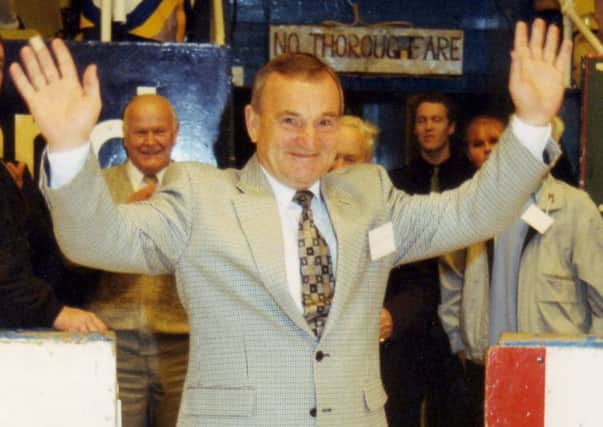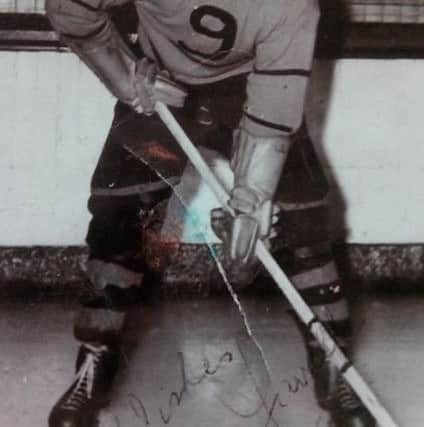Cafe signing led to great days with Flyers ...


The famous cafe on the corner of the Esplanade was where sales reps met up for a coffee and catch up.
Graeme, a grocer to trade, who then worked with Weetabix, and was in town – the company had offices in Commercial Street, now residential flats – when he met up with a group which included Sandy Nicol, Flyers’ team manager.
Advertisement
Hide AdAdvertisement
Hide AdHe had already recruited the fabled Perth Line of Jimmy Spence, Sam McDonald and Eeny Forbes, had Bert Smith and Pep Young signed up, and offered Graeme a spot on the roster.


It was 1963 and, four years after officially hanging up his skates, a new chapter began in his career.
“When Sandy asked me to join, I nearly jumped through hoops,” he recalled.
“My whole career took off from there.”
Over the next two seasons, Graeme was part of a team that swept silverware – seven trophies – and played for Great Britain in the 1965 world championships.
Advertisement
Hide AdAdvertisement
Hide AdJoining Fife also reunited him with lifelong friend Spence, and all the guys who were part of his junior days in Perth.
Graeme and Jimmy grew up doors apart.
As kids they’d skate on the frozen ponds at South Inch before Jimmy’s dad, Laurie, moved jobs from assistant ice master at the rink at Haymarket in Edinburgh to running Perth Ice Rink.
The doors to the ice pad opened.
Pee-wee hockey was set up and they all took their first steps into the sport, with Spence and Forbes quickly stepping up to ice with Perth Panthers.
Back from National Service, Graeme picked up his stick, but the city’s love affair with the sport was short lived.
Advertisement
Hide AdAdvertisement
Hide Ad“They sold the land along with the football ground to Asda, and that killed the sport completely,” he said. “A new rink was built at the site of the old Dewars’ whisky bond, but it wasn’t big enough for ice hockey.
“The Canadians had left in 1955 and we carried on Perth Panthers as an amateur team.
“Jimmy went to Nottingham Panthers to play with guys like Chick Zamick, Eeny and Sam joined Bert down in Altrincham, but I couldn’t go because of my work.”
Glasgow netminder, Charlie Huddlestone – one of the sport’s great characters, immortalised in ice hockey’s Hall of Fame – became something of a pied piper as he rounded up unattached players, packing them into a 12-seater bus and set up games at rinks across the UK.
Advertisement
Hide AdAdvertisement
Hide Ad“We went to Durham, Whitley, Altrincham and even Brighton and Southampton. We’d get in at 3am, and I had to be in work for 8.30 – I couldn’t be late or have a long lie!”
Joining Flyers gave Graeme his most treasured hockey moments.
“To be part of the team was fantastic. We played exhibition games against Canadian army teams – one of them put me through the boards and into hospital with a crushed neck.
“We also had great games against the likes of Edinburgh, who had a strong team, and Paisley where Joe Brown was one tough guy.
Advertisement
Hide AdAdvertisement
Hide Ad“He was a scrap dealer to trade – you had to look out for him and steer well clear of him! He’d cross-check you, and stick you.”
While the Perth line took many of the headlines, and plaudits, Graeme’s line with Smith at centre and Pep on the right was instrumental in the team’s numerous successes.
“It was a great line,” he said. “I was a 100 per cent trier – Jimmy Spence was a natural goalscorer, but I was a fast skater, and I was getting fed passes from two great players.
“We combined well for the team.”
That line plus the Perth trio of Spence-McDonald-Forbes saw Flyers dominate the honours, winning no fewer than nine trophies, including the Grandstand Trophy, which was screened live by BBC.
“We played to their timing,” Graeme recalled.
Advertisement
Hide AdAdvertisement
Hide Ad“We’d do one period and then have to sit and wait until they broadcast a horse race before we could get back on the ice.
“We could be left sitting in our kit, seizing up for half an hour.”
The trophy a replica of the one handed to the BBC Sports Personality of the Year, sits in Flyers’ cabinet to this day, and it was successes on that scale which led Graeme to the world championships in Finland in 1965.
“We had to play France at Wembley and Paris to get a place in the finals, and we won home and away, but matches in Finland were outdoor – it was freezing!
Advertisement
Hide AdAdvertisement
Hide Ad“Temperatures were something like minus ten degrees, which was fine when you were skating, but murder when you were sitting on the bench.
“We broke every single stick in training because of the cold!”
